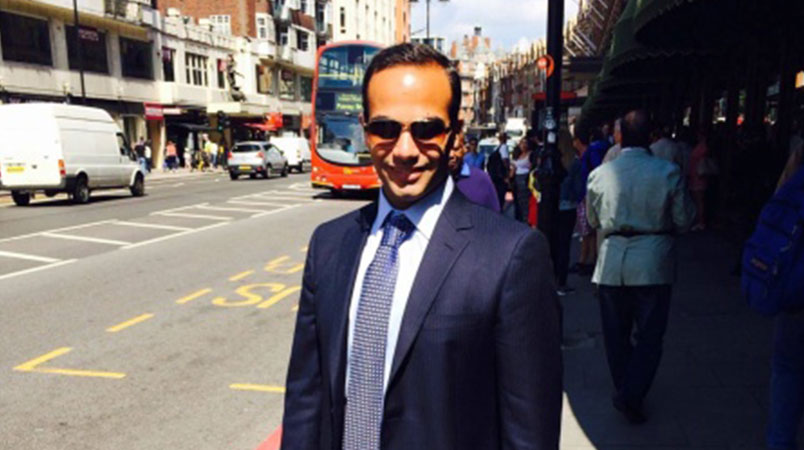Given the lack of savviness with which George Papadopoulos tried to disappear a months-long effort to get Trump campaign officials in a room with Russian government officials who had “dirt” on Hillary Clinton, he may as well have been just a campaign “coffee boy.”
According to Papadopoulos’ guilty plea unsealed Monday, the former Trump campaign advisor attempted to conceal that work from the FBI, destroying records and lying to agents. So instead of landing what he billed to other campaign staff as a “history making” meeting between Donald Trump and Russian President Vladimir Putin, Papadopoulos’ back-channel dealings landed him federal charges.
His first missteps came during his initial interview with FBI agents in Chicago on Jan. 27. Papadopoulos’ statement of offense makes no mention of any counsel accompanying him to that sit-down, where agents informed him that the interview was “completely voluntary,” that lying to the FBI was a “federal offense” and that he could get “in trouble” for doing so.
Papadopoulos proceeded to tell all manner of falsehoods about the “extent, timing, and nature of his communications” with multiple individuals with close ties to the Russian government, according to the statement. One was that a professor with links to Russian officials who supposedly had “dirt” on Clinton approached him about said dirt before he joined the campaign, when in fact he did so over a month after Papadopoulos joined the Trump campaign.
Nick Oberheiden, a federal criminal defense attorney, told TPM that Papadopoulos’ false statements likely served as the “little mosaic pieces” that provided the FBI with the “slam dunk required to make it over the probable cause hurdle” to obtain a search warrant to dig through his online communications.
Once the FBI did, they found copious emails detailing Papadopoulos’ efforts to coordinate an in-person meeting between senior Russian officials and high-level Trump campaign staffers that directly contradicted what he’d told them.
As those communications made clear, growing scrutiny of Trump’s fondness for Putin, which escalated after the GOP candidate urged the Russian government to hack Clinton’s emails in a July 2016 press conference, didn’t dissuade Papadopoulos from continuing to try to organize such a meeting.
Papadopoulos went on to express eagerness to cooperate in a second interview with the FBI on Feb. 16, this time with his counsel present. According to the statement of offense detailing the case, the very next day Papadopoulos deactivated a Facebook account he’d maintained since 2005 that contained records of his communications regarding Russia; several days later, on Feb. 23, he stopped using his cell phone and acquired a new number.
Papadopoulos’ attorneys did not respond to TPM’s request for comment on whether he notified them that he would be taking those steps, which were later cited as evidence he was trying to “impede the FBI’s ongoing investigation.”
As Oberheiden, the criminal defense attorney noted, “I would not advise a client to delete Facebook or anything that may contain information regarding this investigation because then you really get into the obstruction of justice area and that’s a tricky offense.”
Trump and his allies have dismissed the notion that Papadopoulos could possess any information damaging to the campaign, arguing that the 30-year-old, who until recently listed Model U.N. as experience on his LinkedIn profile, was a “volunteer” and “coffee boy” with no real influence. But he was one of just five people Trump named as members of his foreign policy advisory team in March 2016, and emails show he was in frequent touch with senior campaign staffers, forwarding them lengthy chains detailing his efforts to set up a meeting with Russian officials.
And Oberheiden and other attorneys point out that the special counsel likely targeted Papadopoulos precisely because he was a low-level aide who would be easy to “flip,” convincing him to provide any information he may possess about other campaign staffers in exchange for a reduced sentence. The statement of offense notes that in the three months since Papadopoulos was arrested at Dulles International Airport, he has “met with the Government on numerous occasions to provide information and answer questions.”
Until the content of those conversations comes out, Trump’s team is reduced to arguing that the people the campaign named to advisory roles had no idea what they were doing.







Bumbling.
Sums up the entire Trump Administration nicely…
When his name was announced as a trump advisor, everybody scratched their heads, except for the trump campaign and surrogates, who insisted on how brilliant and well qualified he was.
Only the best people.
Not surprising; the attempts to cover a crime typically create more of a trail
“And I would’ve gotten away with it, if it weren’t for you meddling kids!”
https://www.youtube.com/watch?v=hXUqwuzcGeU